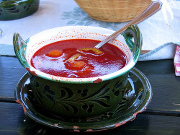|
Home
|
Mar 1, 2010
This week's themeWords borrowed from various languages This week's words goulash cabal potlatch laager baksheesh 
Vegetarian goulash
Photo: Apu Kapadia
 Discuss
Discuss Feedback
Feedback RSS/XML
RSS/XML
A.Word.A.Day
with Anu GargRecently I visited London to attend a wedding. The bride had graduated from Oxford, and among the guests were some of her fellow graduates and a professor. After the long ceremony, we chatted about London weather, Gordon Brown, Queen Lizzie, and language. Among other things, we talked about the differences between British and American English. I recalled reading about the inroads American English is making even in the UK, so I decided to carry out an experiment to find to what extent American English had "corrupted" English English. I told them that sometimes the British write certain numerals (e.g. 1 and 7) differently from how they're written in the US, and asked them to write a short sentence so I could see if there were other differences in the script.
I quickly thought of a sentence for them to write: I said it aloud and the five Oxonians and the Oxford don kindly wrote it down on their napkins. I collected the napkins and then told them about the experiment -- it had nothing to do with handwriting. In reality, that sentence had five words that could be written with American or British spellings (favorite/favourite, flavor/flavour, gray/grey, catalog/catalogue realize/realise). Of the six people who participated in the experiment, three spelled (spelt) everything the British way. The other three had one or more words spelled in American English. What does this experiment prove? Not much, according to my 12-year-old daughter, "Your sample size is too small." Language, by its very definition, is a vehicle of exchange. A language means nothing in a vacuum. When two people share, they give and take, though the movement is not always equal in both directions. The US export of movies, television, music, books, technology, etc. includes something that travels under the radar: Language. Will American English take over the other Englishes? Probably not. Will the English language diverge into distinct languages just as Latin turned into French, Spanish, Italian, and other languages? Hope not. But who knows? Only time can tell, but in the meantime, let's celebrate the diversity of languages by learning words English has borrowed from some of the less-known languages: Hungarian, Hebrew, Nootka, Afrikaans, and Persian. Even though they're not as well-known to most of us, they are still spoken by thousands or millions of people. goulash
PRONUNCIATION:
(GOO-lahsh, -lash)
MEANING:
noun:1. A mixture of disparate elements; hodgepodge. 2. A stew of meat and vegetables, seasoned with paprika. 3. In the game of bridge, a round played with hands produced by a rearrangement of previously dealt cards. ETYMOLOGY:
From Hungarian gulyás, short for gulyáshús (herdsman's meat),
from gulyás (herdsman) + hús (meat).
USAGE:
"Much of what we know is little more than a goulash of disparate and
contradictory ideas, rather than accessible clarity."Ian Mann; Secrets to Being the Cat's Whiskers; The Times (Johannesburg, South Africa); Jan 31, 2010. See more usage examples of goulash in Vocabulary.com's dictionary. A THOUGHT FOR TODAY:
We all wear masks, and the time comes when we cannot remove them without removing some of our own skin. -Andre Berthiaume, novelist (b. 1938)
|